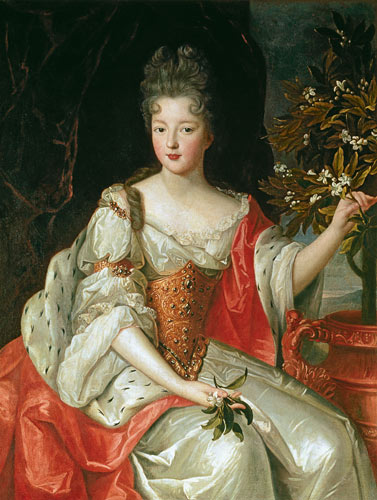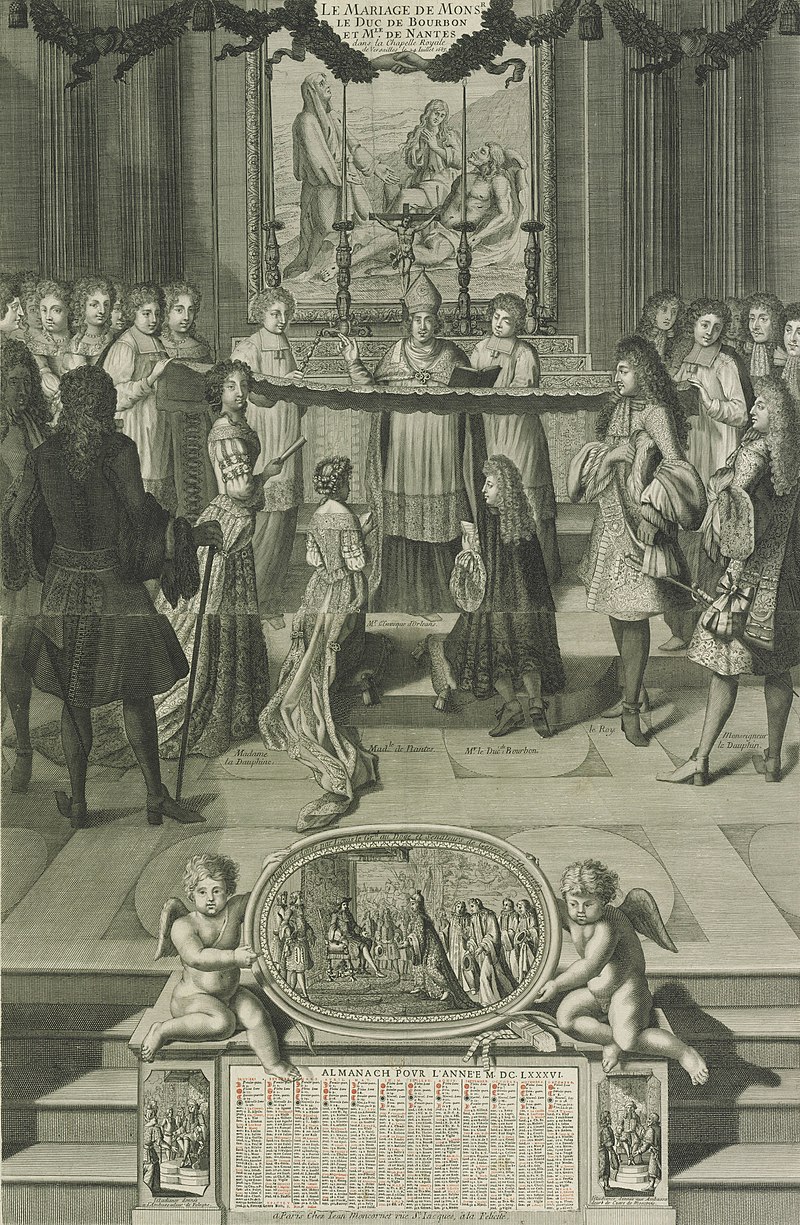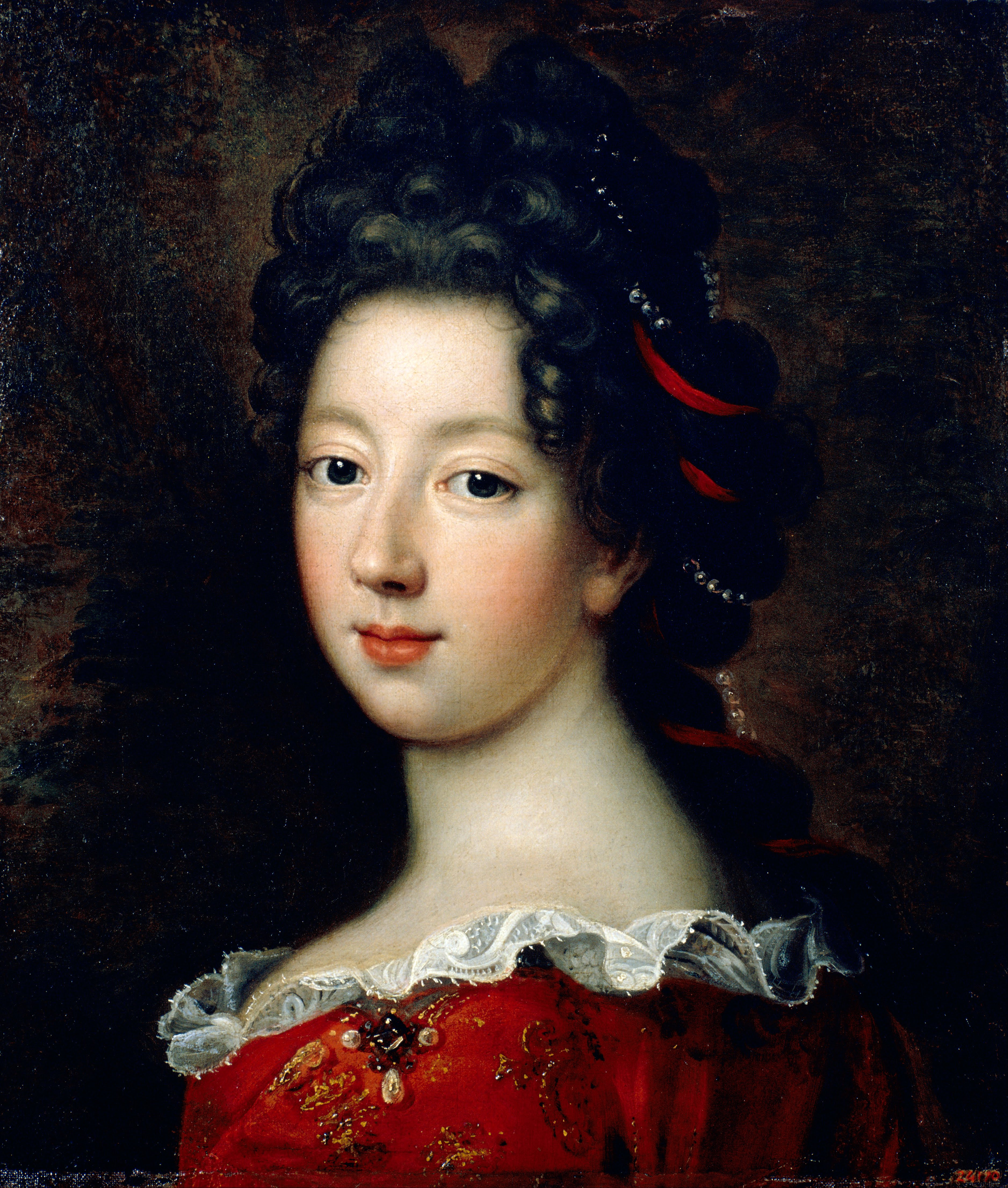 The birth of
Louise Françoise de Bourbon took place on 1 June 1673 but not at a
royal residence or glittering château. Instead, Louise Françoise was
born in Tournai where her parents were on a military tour. The little
girl was not just any little noblewoman – she was the illegitimate
daughter of Louis XIV and Madame de Montespan.
The birth of
Louise Françoise de Bourbon took place on 1 June 1673 but not at a
royal residence or glittering château. Instead, Louise Françoise was
born in Tournai where her parents were on a military tour. The little
girl was not just any little noblewoman – she was the illegitimate
daughter of Louis XIV and Madame de Montespan.
As such her very
birth would have been scandalous had it not been for the current
expectation that a King of France had a mistress – and children
were an inevitable consequence. However, there was one aspect of the
little new addition's birth or rather her baptism. She was promptly
named after Louise de La Valliére whose complicated relationship
with both the parents were well known.
Louise Françoise was placed in the care of the then rather unknown Madame Scarron (the
later Madame de Maintenon). When she was just six months old her
prospects were greatly improved when her father decided to legitimise
his children by his mistress. With the stroke of a pen, she went from
being a bastard who could not expect a prominent role at court to a
legitimée who might very well marry a Prince. With this
honour Louise Françoise became known as Mademoiselle de Nantes at court. To her parents, however, she was simply “Poupotte” - a
nickname derived from her great resemblance to the doll she carried
around with her.
During her early
childhood Louise Françoise's closest friend was her younger sister,
Mademoiselle de Tours, who was born the year after Louise Françoise herself. The two girls lived closely together with Madame Scarron and
the ever-increasing flock of siblings. In 1681 Mademoiselle de Tours
died which left Louise Françoise devastated. The loss was especially
hard on her since she had never been close with her other sisters and
never would be; their relationships were marred by an intense
jealousy already from their childhood.
As she grew up it
became clear that Louise Françoise was truly the child of Louis XIV
and Madame de Montespan. Like her father, she was an eminent dancer
and at the age of 9 had the honour of presenting Youth in ballet
performed to the Dauphine herself. Likewise, the infamous
Mortemart-wit that flowed through her mother was deeply rooted in the
young girl. Also, she had the advantage of having a very pretty face
and an ability to please everyone she met.
 |
| Wedding of Louise Francoise and the Duc de Bourbon |
Certainly, such a
young woman must be a catch especially with her connection to the
King. At the age of 11 years old Louise Françoise was wed to Louis
de Bourbon, Duc de Bourbon on 25 May 1685. With this new marriage the
hitherto only title of Louise Françoise was replaced with that of
Duchesse de Bourbon or simply Madame la Duchesse.
Now firmly
established at court, Louise Françoise began her career as a noblewoman. One of her pursuits included writing verses which were
often acidly directed at other courtiers. At one time she incurred
the wrath of her august father who had learned of a verse she had
written about himself. That might have gone further had not Louise Françoise contracted smallpox roughly a year after her wedding. Her
husband chose not to stay with her but she was not completely
abandoned and recovered.
Louise Françoise had maintained a close relationship with her mother even after she
retired to a convent. Her mother's death in 1707 put Louise Françoise and her siblings in a dilemma: the King had expressly
forbidden his courtiers to wear mourning at court events. As a silent
protest the children simply did not appear at court events.
However, not
every relationship had gone quite as well. Louise Françoise still
harboured a gnawing jealousy of her younger sisters and that was
about to take a turn for the worse. In 1692 her youngest sister – Françoise Marie – married the only son of Monsieur, the King's
brother. This meant that Françoise Marie now outranked her elder
sister. Louise Françoise was furious. Their open rivalry only worsened over the years especially when Françoise Marie became Madame
la Princesse on the death of her father-in-law. Originally, it was
Louise Françoise who should have inherited that title but on the death of Louise Françoise's father-in-law the title was transferred
to the House of Orlèans. Louise Françoise once again felt cheated
and did nothing to hide her displeasure.
Perhaps in
response to these setbacks she began a hardly secret affair (just
three years after her sister's wedding) with Françoise Louis de
Bourbon, Prince de Conti. As a matter of fact this might be seen more
as an affront to her other half-sister (Marie Anne) whose
brother-in-law the Prince de Conti was. Her husband was enraged but
refrained from taking actions against his wife due to her being the
King's daughter. She did find support in the Dauphin, though, and he
would let the lovers use his estate of Meudon as a meeting place.
 Meanwhile,
Louise Françoise's marriage had produced three children when she
became pregnant again. It was widely supposed that the daughter she
gave birth to was fathered by the Prince de Conti. Her husband needed
not worry about lacking heirs. Upon his death in 1710 the couple had
had eight children. From that point on Louise Françoise chose to be
known as Madame the Dowager Duchess.
Meanwhile,
Louise Françoise's marriage had produced three children when she
became pregnant again. It was widely supposed that the daughter she
gave birth to was fathered by the Prince de Conti. Her husband needed
not worry about lacking heirs. Upon his death in 1710 the couple had
had eight children. From that point on Louise Françoise chose to be
known as Madame the Dowager Duchess.
Louise Françoise had become rather close friends with the Dauphin and as the King grew
older and weaker, she eyed an opportunity to stay close to the
throne. Those hopes were shattered shortly afterwards when the
Dauphin died unexpectedly. Once again it would seem that fate was
against Louise Françoise when the new heirs to the throne became the
Duc and Duchesse de Bourgogne.
Louise Françoise and the new Dauphine were bitter enemies and the former shed no tears
when the Dauphine died just two years later. When the King, her
father, died another crisis arose: who were to be declared regent?
One candidate was her brother and the other was her brother-in-law.
As is well-known the Duc d'Orlèans (the brother-in-law) was chosen
which fuelled the fire between Louise Françoise and Françoise Marie
– the latter was now the highest-ranking lady in all of France.
The 1720's were
an eventful time for Louise Françoise . She built the gorgeous Palais
Bourbon in the heart of Paris where she spent the majority of her
time. Around the same time she began an affair with the Marquis de
Lassay; he even went so far as to built a hôtel of his own
immediately across from his mistress'.
Apparently,
Louise Françoise had maintained a grasp on influence with the royal
family and when the Dauphin was born she was asked to stand
god-mother. Louise Françoise never remarried and appeared to have
enjoyed the freedom of her widowhood. She died at the age of 70 on 16
June 1743

No comments:
Post a Comment